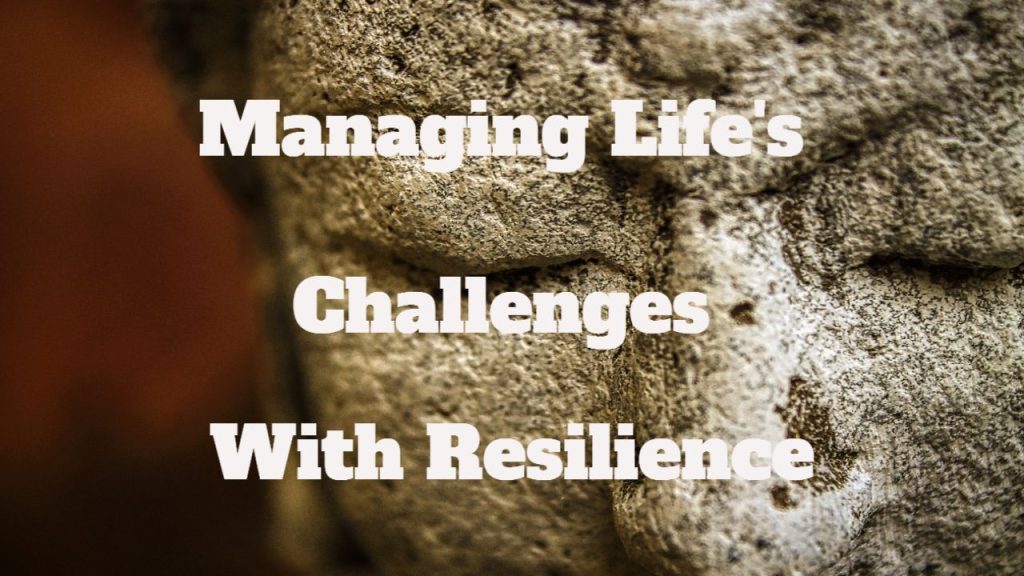Managing Life’s Challenges with Resilience
Learn how to improve your ability to recover from suffering.
The capacity to deal with and bounce back from hardship is what we mean when discussing resilience. People who remain calm amid calamity are resilient.
A resilient person has good coping abilities and can mobilise available resources, seek help when necessary, and find solutions to the problem.
People with psychological resilience can use their abilities and strengths to respond to life’s obstacles, which may include:
A loved one has died.
Divorce
Financial concerns.
Illness
Job loss.
Medical emergency.
Natural calamities.
Resilient people confront life’s challenges head-on instead of succumbing to despair or avoiding problems by employing unhealthy coping techniques.
Resilient people feel no less distress, grief, or anxiety than others. Instead, they employ healthy coping strategies to deal with challenges, promoting strength and growth, frequently emerging more robust than before.
This article looks at the indications, characteristics, and causes of resilience. It also discusses some practices that can help people become more resilient.
Signs of Resilience
Resilient people frequently exhibit a variety of attributes that aid them in overcoming life’s hardships. Some of the signs of resilience are:
A survivor’s mentality
When someone is resilient, they see themselves as survivors.
They understand that even when things become difficult, they can persevere until they succeed.
Effective emotional management
Resilience is characterised by the ability to manage emotions in the face of stress. This is not to say that resilient people do not feel powerful emotions like anger, grief, or fear.
It signifies that they understand that those emotions are fleeting and can be managed till they pass.
Feeling in control
Resilient people have a strong internal locus of control and believe that their actions may influence the outcome of events.
Problem-solving skills
When issues develop, resilient people assess the situation rationally and attempt to devise solutions that will make a difference.
Self-compassion
Self-acceptance and self-compassion are additional indicators of resilience. Resilient people are kind to themselves, even during difficult times.
Social support
Having a solid support network is another evidence of resilience. Resilient people understand the value of support and know when to seek assistance.
Resilience is characterised by the ability to manage emotions, a sense of confidence and control, practical coping abilities, and the ability to seek social assistance when necessary.
Types of Resilience
Resilience indicates the ability to deal with life’s setbacks and is a general indicator of adaptability. However, several varieties of resilience impact a person’s capacity to cope with stress.
Physical Resilience
Physical resilience relates to how the body adapts to change and rebounds from physical stresses, illnesses, and injuries.
According to research, this form of resilience significantly impacts health. It affects both the rate of ageing and how the body deals with and recovers from physical strain and illness.
People’s physical resilience can be improved by adopting a healthy lifestyle. A few ways to strengthen this resilience are to get adequate sleep, eat well, and exercise frequently.
Mental Resilience
The capacity to deal with adversity and maintain composure is known as mental resilience. People with this level of resilience are adaptable and calm during times of crisis.
They employ mental power to overcome difficulties, move forward, and maintain hope despite setbacks.
Emotional Resilience
To be emotionally resilient is to control one’s emotions in the face of adversity. Resilient people know their emotional reactions and connect strongly to their inner lives.
As a result, individuals can relax and manage their emotions when confronted with dire circumstances.
This form of resilience also helps people maintain their optimism throughout difficult situations.
Because they are emotionally resilient, they recognise that adversity and negative feelings do not continue forever.
Social Resilience
Social or community resilience refers to a group’s ability to rebound from harsh events.
People interact with others and collaborate to solve challenges that affect them personally and collectively.
Coming together after disasters, social support, becoming aware of the community’s hazards, and developing a feeling of community are all examples of social resilience.
Such answers can be critical at difficult times, such as natural disasters that affect entire communities or large groups of individuals.
What are the four categories of resilience?
Resilience can take various forms. There are four types of resilience: bodily resilience, mental resilience, emotional resilience, and social resilience.
Causes of Resilience
Some people are innately resilient, possessing personality attributes that enable them to remain calm in adversity.
However, these behaviours are not simply inborn tendencies that affect only a few people. Resilience is the product of a complex interplay of internal and external factors, including genetics, physical fitness, mental health, and environment.
Social support is another critical factor that contributes to resilience. Mentally strong people often have the support of family and friends to help them get through difficult situations.
Resilient persons tend to have features such as:
Being an effective communicator
Having an internal locus of control.
High emotional intelligence and good emotion management
Possessing self-esteem and confidence in one’s talents.
Having the ability to establish realistic plans and stick to them
Seeing themselves as fighters, not victims of circumstance
Impact of Resilience
Resilience provides humans with the psychological strength to deal with stress and adversity.
It is the mental reserve of strength that people can rely on to get through difficult situations.
Psychologists believe resilient people can better deal with adversity and reconstruct their lives after setbacks.
Dealing with change or loss is an unavoidable aspect of life.
Everyone has setbacks at some point in their lives. Some of these problems may be trivial (not being accepted into a class or being denied a job promotion). In contrast, others may be catastrophic on a much grander scale (hurricanes and terrorist strikes).
Those lacking resilience may be overwhelmed by such situations. They may focus on difficulties and employ ineffective coping techniques to deal with them.
Disappointment or failure may lead individuals to engage in harmful, destructive, or dangerous behaviours. These people recover from setbacks more slowly, which can lead to increased psychological suffering.
How people react to these issues can significantly impact the immediate outcome and long-term psychological effects.
Resilience does not eradicate stress or life’s challenges.
People with this trait do not view life through rose-coloured glasses. They recognise that setbacks are unavoidable and that life can be difficult and terrible.
They still feel the terrible emotions that come with a catastrophe, but their mental approach enables them to work through them and recover.
Resilience empowers people to face difficulties head-on, overcome hardship, and move on.
Following large-scale catastrophes such as terrorist attacks, natural disasters, and the COVID-19 pandemic, many people exhibited resilience-related behaviours, and as a result, they suffered fewer symptoms of sadness.
Despite seemingly inconceivable catastrophes, resilience enables people to summon the courage to survive and thrive.
How to Be More Resilient
Fortunately, people can develop resilience in themselves. Parents can also help their children build resilience. Developing more resilience is possible with the help of certain practices.
Reframe negative thoughts.
Resilient people can look at unpleasant situations rationally without blaming or worrying about what cannot be altered.
Instead of viewing hardship as overwhelming, reframe your thinking to look for tiny methods to address the issue and make changes that will help.
Focusing on the positive things you can accomplish is an excellent technique to overcome a negative mindset.
This method can also teach children how to better deal with obstacles. Please encourage them to approach obstacles in a more optimistic, hopeful manner.
Instead of becoming locked in a cycle of negative feelings, a youngster can learn to view these occurrences as opportunities to challenge themselves and gain new skills.
Seek Support.
Talking about life’s challenges does not make them go away, but talking with a caring friend or loved one can help people feel they have someone on their side. This can aid in the development of resilience. Discussing things with others can also help people acquire insight into the issues they are encountering and develop fresh ways to manage them.
Adults can help a kid create a support network by modelling excellent social skills such as sharing feelings, being empathic, working with and helping others, expressing gratitude—and remembering to encourage a child’s good behaviour.
Concentrate on what is under your control.
When confronted with a crisis or difficulty, it is easy to become overwhelmed by circumstances beyond our control.
Instead of wishing we could go back or change things, try concentrating on what we can directly influence.
Adults can also help youngsters acquire this skill by discussing their predicament and assisting them in devising a response strategy.
Even if the situation appears wrong, practical efforts can help improve it. These modest changes can help you feel more in control and resilient.
Manage stress.
Developing appropriate stress-management habits is an effective method to boost overall resilience.
These habits could include behaviours that benefit overall health, such as obtaining adequate sleep and exercise, as well as specific measures to take during stressful times, such as:
Cognitive Restructuring
diaphragmatic breathing exercises
Expressive writing.
Biofeedback Techniques
Effective communication.
Problem-solving strategies.
Progressive muscular relaxation.
These abilities are teachable and, with practice, may be mastered by both children and adults.
They eventually develop the confidence to tackle unpleasant situations and the resilience to recover rapidly.
Those having difficulty controlling their stress levels may benefit from the services of a cognitive therapist.
While some people are more naturally resilient, it is a skill that can be developed.
Looking at situations more positively, seeking assistance from others, and focusing on what can be managed are all effective tactics. Good stress management abilities can also promote resilience.
If you are having difficulty coping with issues, do not be reluctant to speak with your healthcare physician or a mental health expert.
Resilient people require assistance; one aspect of resilience is knowing when to seek help.
The Article Managing Life’s Challenges with Resilience Appeared First On Survival Avenue.
The post Managing Life’s Challenges with Resilience appeared first on Survival Bite.
The Article Managing Life’s Challenges with Resilience Was Found On https://limitsofstrategy.com




Comments are closed